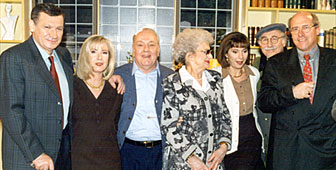Mariuccia Medici: dialect is part of our roots

During her long stage and television career, Mariuccia Medici, the 91-year-old doyenne of Ticino dialect theatre, has embodied many of the characters most popular with the people of the region.
For 40 years, she was a primary school teacher at Lugano-Loreto where she taught hundreds of pupils to speak and write Italian. But it has been her acting that has made her a household name.
“I have absolutely no sense of being a star, even though people often come up and say nice things to me when I’m out shopping. It’s to television that I owe my popularity; plays in dialect still get the highest ratings on Italian-language Swiss television.
Maybe the people of Ticino love me because they hear me speaking dialect in these plays and regard me as one of their own. But I don’t set much store by my popularity; like everyone, “porti giò la mia tola dal rüt” – I have to empty my dustbin every morning – a typical dialect expression to say that a person hasn’t become stuck-up.
Dialect is part of my life, an intimate part of me, though sometimes I feel almost ill when I hear the dialect that’s spoken nowadays in Ticino.
Unfortunately, in recent years our dialect has been – to use a not very pleasant word – “bastardised” by Italian. What I mean is that there’s now a craze for transforming Italian words into dialect, with ridiculous results.
True dialect – still spoken by the older generations – has lost its vitality and richness, its ability to renew itself, to create new words connected with everyday life.
Since the 1960s, there’s been something of a movement to deprive us of our dialect. I remember that some of my primary teacher colleagues would forbid their pupils to use it. This was partly because some of them struggled to speak good Italian; they would transform dialect words into Italian – with results as ridiculous as those we’re seeing at present, but in reverse.
When I was a teacher, though, I did all I could to defend dialect. In those days, it wasn’t particularly difficult. Thirty years ago, almost all our children spoke dialect, with very few exceptions: the children of immigrants or German-Swiss parents, or the odd wealthy family.
But even these children learned it fast because otherwise they risked being marginalised, excluded from games by their peers. They were almost ashamed. Now though, the shoe is on the other foot, it’s the ones who still speak dialect who are made to feel ashamed.
In any case, I am convinced that dialect will never die out. Some of my fans are very young indeed – just 16 or 17. This shows that today’s Internet generation can still take pleasure in dialect drama.
But increasingly I get the impression that people no longer feel the need to go in search of their roots. And dialect roots go back a very long way.”
Mariuccia Medici

In compliance with the JTI standards
More: SWI swissinfo.ch certified by the Journalism Trust Initiative
You can find an overview of ongoing debates with our journalists here . Please join us!
If you want to start a conversation about a topic raised in this article or want to report factual errors, email us at english@swissinfo.ch.